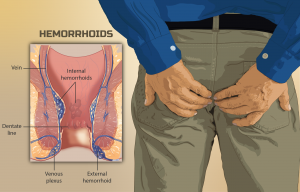
It’s not a topic most people discuss with their friends over a cup of joe or with their family around Sunday lunch. In fact, it’s not a topic most people discuss with their physicians. Some people say it’s just a nuisance, easily treated with over the counter medications. Others find themselves in the emergency room with excruciating pain, perhaps weakly joking to the nursing staff about being a pain in the butt.
So here it is: everything you always wanted to know about hemorrhoids (and maybe some you didn’t want to know) but were afraid to ask.
Q: What exactly are hemorrhoids?
Hemorrhoids are engorged blood vessels around the anal canal. The blood vessels are always there, but when they become inflamed or enlarged, you may start to feel symptoms of hemorrhoids.
Q: I’ve heard hemorrhoids can cause blood with my stool. Is that true?
Yes. Hemorrhoids may manifest as a small amount of blood when you wipe after a bowel movement. This is painless. Hemorrhoids may also manifest as itching around the anal opening, or feeling like there’s a small lump near the anus. In more extreme cases, you may feel the need to push a hemorrhoid that has fallen out of the anal opening back into the body.
Q: Is there anything I can do to naturally reduce hemorrhoids? I don’t like to take medication if I can help it.
Great question. Hemorrhoids become worse if you’re constipated or you’re putting a lot of pressure on hour rear end. So, you should do things that help your bowel movements stay soft and regular. These include drinking plenty of water (bearing in mind that you may require more water if you live in a hot climate or exercise more), eat plenty of fiber containing foods (such as fruits, vegetables, and whole grain breads), and get plenty of exercise to stimulate the digestive system to keep things moving. A note on exercise, though: the strain of heavy duty weight lifting can make hemorrhoids worse. You should always listen to your body when you exercise and make sure you’ve checked with your doctor before you start a new exercise program. You can also prevent hemorrhoids by getting off the toilet as soon as you’ve finished, instead of lingering there reading/playing on your phone, etc.
Q: I’ve tried all the over the counter stuff, but nothing is working. What should I do next?
It’s time to make an appointment with your doctor for further evaluation.
Q: What kinds of tests could my doctor recommend?
Your doctor will start by talking to you about your symptoms and examining you. This is the part most people are nervous about and your doctor understands that. He or she will be as gentle as possible and make sure the exam is conducted with your dignity in mind. Your doctor may be able to see evidence of a hemorrhoid just by looking at the rectal area or may need to place their gloved finger into your rectum to help determine whether they can feel hemorrhoids on the inside of your body. While this exam is uncomfortable, it should not be painful.
Your doctor may also recommend further examination with a camera. This is usually done at a gastroenterologist’s office, like ours. When you come into our office, we will talk to you about your symptoms, your family history, and what treatment options you’ve tried in the past. Then we will recommend what should be done next.
Q: Are hemorrhoids life threatening? Do they cause cancer?
Hemorrhoids are not life threatening and are not a precursor to cancer. In some rare cases, if they become infarcted (a clot forms in the hemorrhoid), they can become very painful and require urgent surgery. However, in most cases, hemorrhoids can be treated successfully using either medications, lifestyle changes, or routine surgery.
Q: What if I have other questions?
Give us a call! We’re always happy to help.

Share This